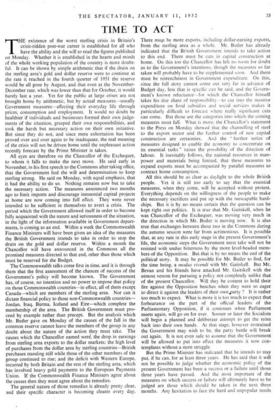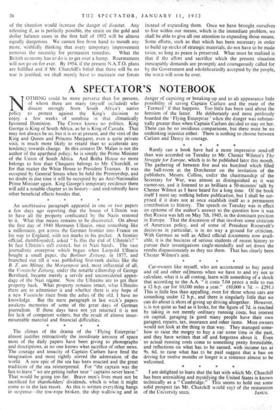TIME TO ACT
THE existence of the worst sterling crisis in Britain's crisis-ridden post-war career is established for all who have the ability and the will to read the figures published on Monday. Whether it is established in the hearts and minds of the whole working population of the country is more doubt- ful. It can be shown by simple arithmetic that if the drain on the sterling area's gold and dollar reserve were to continue at the rate it reached in the fourth quarter of 1951 the reserve would be all gone by August, and that even at the November- December rate, which was lower than that for October, it would barely last a year. Yet for the public at large crises are. not brought home by arithmetic, but by actual measures—usually Government measures—affecting their everyday life through prices, consumption and employment. It would no doubt be healthier if individuals and businesses formed their own judge- ments of the situation, grasped their own responsibilities, and took the harsh but necessary action on their own initiative. But since they do not, and since mere exhortation has been proved over and over again to be inadequate, the real meaning of the crisis will not be driven home until the unpleasant action recently forecast by the Prime Minister is taken.
All eyes are therefore on the Chancellor of the Exchequer, to whom it falls to make the next move. He said early in November, in his first speech to the Commons after taking office, that the Government had the will and determination to keep sterling strong. He said on Monday, with equal emphasis, that it had the ability to do so. Nothing remains now but to take the necessary action. The measures announced two months ago to limit imports and discourage inessential capital projects at home are now coming into full effect. They were never intended to be sufficient in themselves to avert a crisis. The period which the Government allowed itself in order to become fully acquainted with the nature and seriousness of the situation, in the light of the information available in Government depart- ments, is coming to an end. Within a week the Commonwealth Finance Ministers will have been given an idea of the measures the British Government intends to take in order to stop the drain on the gold and dollar reserve. Within a month the Chancellor will have announced in the Commons all the promised measures directed to that end, other than those which must be reserved for the Budget.
The Commonwealth talks come first in time, and it is through them that the first assessment of the chances of success of the Government's policy will become known. The Government has, of course, no intention and no power to impose that policy on those Commonwealth countries—in effect, all of them except Canada—which are members of the sterling area. Nor can it dictate financial policy to those non-Commonwealth countries— Jordan, Iraq, Burma, Iceland and Eire—which complete the membership of the area. The British Government must pro- ceed by example rather than precept. But the analysis which Mr. Butler gave on Monday of the causes of the fall in the common reserve cannot leave the members of the group in any doubt about the nature of the action they must take. The causes which the Chancellor named were, the drop in earnings from sterling area exports to the dollar markets; the high level of purchases from the dollar area by sterling countries—British purchases standing still while those of the other members of the group continued to rise; and the deficit with Western Europe, incurred by both Britain and the rest of the sterling area, which has -involved heavy gold payments to the European Payments Union. If the Commonwealth Finance Ministers agree about the causes then they must agree about the remedies.
The general nature of those remedies is already pretty clear, and their specific character is becoming clearer every day. There mug be more exports, including dollar-earning exports, from the sterling area as a whole. Mr. Butler has already indicated that the British Government intends to take action to this end. There must be cuts in capital construction at home. On this too the Chancellor has left no room for doubt as to the Government's intentions, though the measures so far taken will probably have to be supplemented soon. And there must be retrenchment in Government expenditure. On this, since the full story cannot come out very far in advance of Budget day, less that is specific can be said, and the Govern- ment's known reluctance—for which the Chancellor himself takes his due share of responsibility—to cut into the massive expenditure on food subsidies and social services makes it particularly difficult to forecast where really significant cuts can come. But those are the categories into which the coming measures must fall. What is more, the Chancellor's statement to the Press on Monday showed that the channelling of steel to the export sector and the further control of new capital construction are certainties. And the "further series of measures designed to enable the economy to concentrate on its essential tasks" raises the possibility of the direction of labour. It inevitably follows, the national resources in man- power and materials being limited, that these measures to expand exports must be accompanied by parallel measures to contract home consumption.
All this should be as clear as daylight to the whole British people. Yet it is still too early to say that the essential measures, when they come, will be accepted without protest. Everything depends on the willingness of the people to make the necessary sacrifices and put up with the inescapable hard- ships. But it is by no means certain that the question can be kept right out politics. It is true that Mr. Gaitskell, when he was Chancellor of the Exchequer, was moving very much in the direction in which Mr. Butler is moving now. .It is also true that exchanges between these two in the Commons during the autumn session were far from acrimonious. It is possible that, at any rate in this early stage in the present Government's life, the economic steps the Government must take will not be resisted with undue bitterness by the more level-headed mem- bers of the Opposition. But that is by no means the end of the political story. It may be possible for Mr. Butler to find, for the time being, a modus vivendi with Mr. Gaitskell. But Mr. Bevan and his friends have attacked Mr. Gaitskell with the utmost venom for pursuing a policy not completely unlike that of the present Chancellor. Will they be content to hold their fire against the Opposition benches when they were so eager to direct it against the leaders of their own,party ? It is rather too much to expect. What is more it is too'much to expect that forbearance on the part of the official leaders of the Parliamentary Opposition, if it continues when Parliament meets again, will go on for ever. Sooner or later the Socialists will begin a planned and deliberate attempt to get the reins back into their own hands. At that stage, however restrained the Government may wish to be, the party battle will break out again. It is not even safe to assume that the Government will be allowed to put into effect the measures it now con- templates without a stern struggle.
But the Prime Minister has indicated that he intends to stay put, if he can, for at least three years. He has said that it will not be possible to judge whether the economic policy of the present Government has been a success or a failure until those three years have passed. And the most important of the measures on which success or failure will ultimately have to be judged are those which should be taken in the next three months. Any hesitation to face the hard and unpopular needs of the situation would increase the danger of disaster. Any relenting if, as is perfectly possible, the strain on the gold and dollar balance eases in the first half of 1952 will be almost equally dangerous. We cannot live from hand to mouth any more, wishfully thinking that every temporary improvement removes the necessity for permanent remedies. What the British economy has to do is to get over a hump. Rearmament will not go on for ever. By 1954, if the present N.A.T.O. plans are fulfilled and if Mr. Churchill's belief that there will be no war is justified, we shall merely have to maintain our forces instead of expanding them. Once we have brought ourselves to live within our means, which is the immediate problem, we shall be able to give all our attention to expanding those means. Some efforts, such as that which has been necessary in order to build up stocks of strategic materials, do not have to be made twice, so long as peace is preserved. What must be realised is that if the effort and sacrifice which the present situation inescapably demands are promptly and courageously called for by the Government and wholeheartedly accepted by the people, the worst will soon be over.



































 Previous page
Previous page